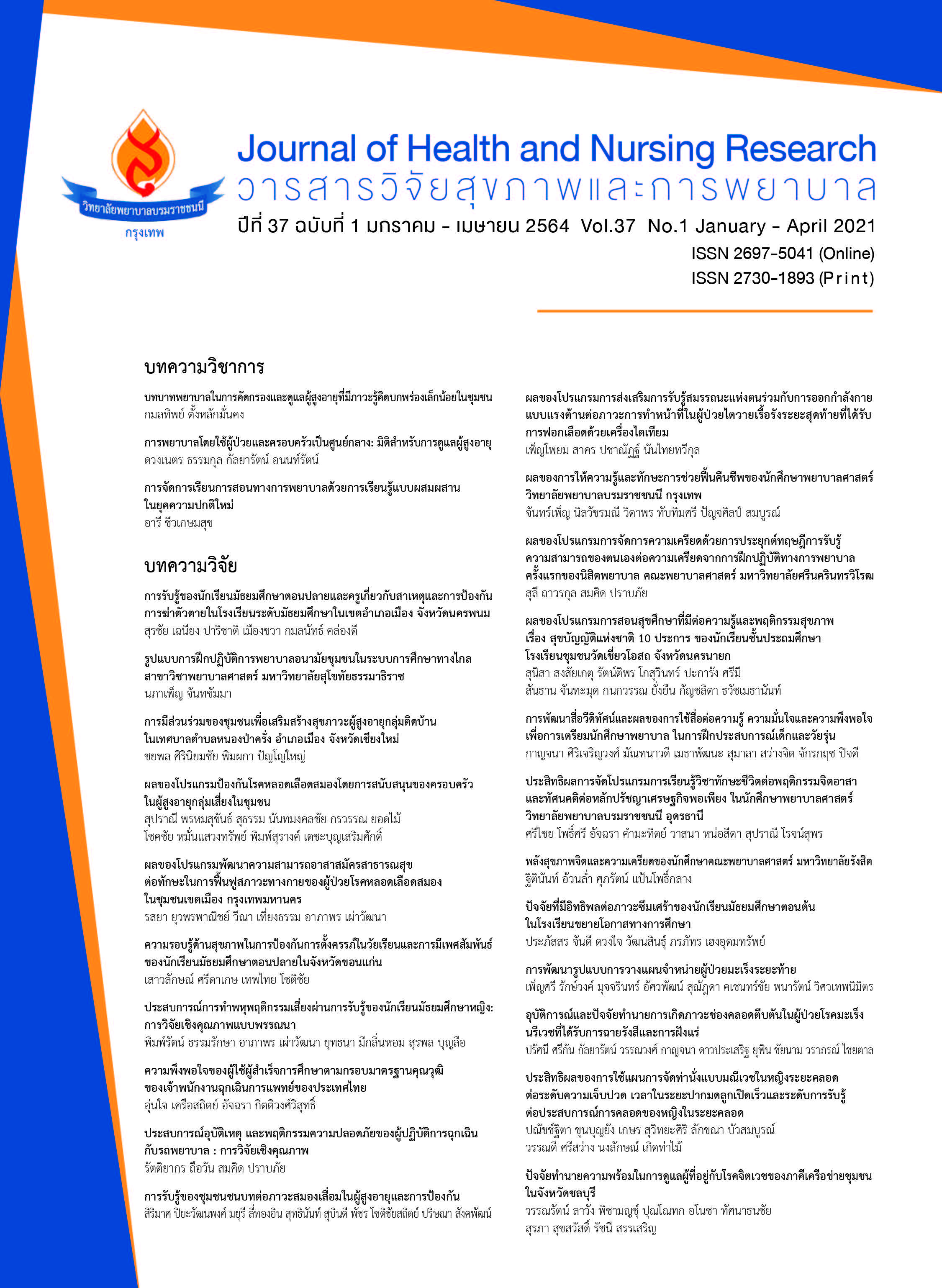บทบาทพยาบาลในการคัดกรองและดูแลผู้สูงอายุ ที่มีภาวะรู้คิดบกพร่องเล็กน้อยในชุมชน
คำสำคัญ:
การคัดกรอง, ภาวะรู้คิดบกพร่องเล็กน้อย, ผู้สูงอายุ, สมองเสื่อมบทคัดย่อ
บทนำ: ภาวะรู้คิดบกพร่องเล็กน้อย (Mild Cognitive Impairment หรือ MCI ) เป็นอาการที่เกิดขึ้นก่อนภาวะสมองเสื่อม ซึ่งเป็นช่วงเวลาของกระบวนการพัฒนาจากผู้สูงอายุในภาวะปกติ ไปสู่การเป็นอัลไซเมอร์หรือสมองเสื่อมชนิดอื่น วัตถุประสงค์: เพื่ออธิบายคำจำกัดความของภาวะรู้คิดบกพร่องและภาวะสมองเสื่อม การคัดกรองภาวะรู้คิดบกพร่อง และบทบาทพยาบาลในการคัดกรองและดูแลผู้สูงอายุ ประเด็นสำคัญ ภาวะรู้คิดบกพร่องเล็กน้อยและสมองเสื่อมเล็กน้อยเป็นภาวะที่สำคัญ เพราะเป็นอาการ และอาการแสดงที่พบได้โดยทั่วไปในกลุ่มผู้สูงอายุในชุมชน ภาวะรู้คิดบกพร่องเล็กน้อยเป็นภาวะที่หากผู้ป่วยมีปัญหาด้านความจำ จะมีแนวโน้มเป็นสมองเสื่อมอัลไซเมอร์มากกว่าสมองเสื่อมชนิดอื่น ๆ อย่างไรก็ตามภาวะรู้คิดบกพร่องเล็กน้อย ไม่จำเป็นต้องพัฒนาไปเป็นโรคอัลไซเมอร์เสมอไป ขึ้นกับด้านที่มีความบกพร่อง ผู้สูงอายุบางรายอาจกลับมาเป็นปกติ มีอาการคงที่หรือชะลอการเกิดโรคได้ หากได้รับการคัดกรอง และส่งเสริมกิจกรรมที่เหมาะสมในระยะเริ่มต้น แต่ในปัจจุบันยังมีการใช้คำที่ผิดและเข้าใจสับสนในการจำกัดความของภาวะสมองเสื่อม ทำให้ผู้สูงอายุหลายคนถูกตีตราว่าเป็นสมองเสื่อม ซึ่งหมายถึงการเป็นบุคคลที่มักหลงลืมทุกสิ่ง หลงทาง และช่วยเหลือตัวเองไม่ได้ ทั้งที่จริงแล้วผู้สูงอายุอาจมีภาวะเพียงการรู้คิดบกพร่องเล็กน้อย สรุป: ความสามารถในการสังเกตุอาการและคัดกรองการรู้คิดบกพร่องเล็กน้อย รวมทั้งสามารถส่งต่อได้อย่างถูกต้องและทันเวลา จึงเป็นอีกหนึ่งบทบาทสำคัญของพยาบาลในชุมชนเพื่อการดูแลผู้สูงอายุให้มีศักยภาพในการพึ่งตนเองให้ได้นานที่สุด โดยไม่เป็นภาระของครอบครัว ข้อเสนอแนะ: การคัดกรองภาวะรู้คิดบกพร่องเล็กน้อยได้ในช่วงเริ่มต้นเป็นสิ่งสำคัญมาก พยาบาลควรระลึกไว้เสมอว่า แม้ว่าภาวะสมองเสื่อมจะพบบ่อยในผู้สูงอายุ แต่ภาวะสมองเสื่อมไม่ใช่ภาวะปกติที่ต้องเกิดขึ้นในวัยสูงอายุ
Downloads
เอกสารอ้างอิง
2. World Health Organization. Evidence profile: cognitive impairment in integrated care for older people (ICOPE) Guidelines on community-level interventions to manage declines in intrinsic capacity. https://www.who.int/ageing/health systems/icope/evidence-centre/ICOPEevidence-profile-cognitive.pdf?ua=1.2017
3. Gillis C, Mirzaei F, Potashman M, Ikram MA, Maserejian N. The incidence of mild cognitive impairment: a systematic review and data synthesis. Amsterdam : Alzheimer's & Dementia 2019;11:248-56.
4. Taylor CA BE, McGuire LC, . Subjective Cognitive Decline Among Adults Aged ≥45 Years United States,2015-2016. MMWR Morb Mortal Wkly Rep 2018;67(27):753-7.
5. Petersen RC, Lopez O, Armstrong MJ, Getchius T, Ganguli M, Gloss D, et al. Practice guideline update summary: Mild cognitive impairment: Report of the guideline development, dissemination, and implementation subcommittee of the American Academy of Neurology. Neurology 2018;90(3):126-1335.
6. Prasartkul P, Vapattanawong P, Rittirong J, Chuanwan S, Kanchanachitra M, Jaratsit S, et al. The Situation of the Thai elderly 2016. Bangkok: Institute for Population and Social Research, Mahidol University and Foundation of Thai Gerontology Research and Development Institute (TGRI); 2017 (in Thai).
7. Rattanawat W, Nakawiro D, Visajan P. Prevalence of Mild Cognitive Impairment (MCI) in Pre-Retirement Period of Hospital Staff. Journal of Psychiatry Association Thailand 2018;63(1):55-64. (in Thai)
8. Muangpaisan W, Petcharat C, Srinonprasert V. Prevalence of potentially reversible conditions in dementia and mild cognitive impairment in a geriatric clinic. Geriatr Gerontol Int 2012;12(1):59-64.
9. Tiyapanit C, Tangwongchai S, Champaiboon J. Prevalence and fall risk in mild cognitive impairment and dementia at outpatient clinics, King Chulalongkorn Memorial Hospital. Chula Med J 2018;62(5):799-813.
10. Petersen RC, Caracciolo B, Brayne C, Gauthier S, Jelic V, Fratiglioni L. Mild cognitive impairment: a concept in evolution. Journal of internal medicine 2014;275(3):214-28.
11. Butchard S, Donaldson M, Reichelt K. What is mild cognitive impairment (MCI)? England, Wales and Northern Ireland: Alzheimer’s Society; 2019.
12. Petersen RC. How early can we diagnose Alzheimer disease and is it sufficient? The 2017 Wartenberg lecture. Neurology. 2018.
13. Albert MS, DeKosky ST, Dickson D, Dubois B, Feldman HH, Fox N C., et al. The diagnosis of mild cognitive impairment due to Alzheimer’s disease: Recommendations from the National Institute on Aging-Alzheimer’s Association workgroups on diagnostic guidelines for Alzheimer’s disease. Alzheimer’s & Dementia. The Journal of the Alzheimer's Association 2011;7(3):270–9.
14. Knopman DS, Petersen RC. Mild cognitive impairment and mild dementia: a clinical perspective. Mayo Clinic proceedings 2014;89(10):1452-9.
15. Tanglakmankhong K, Hampstead BM, Ploutz-Snyder R, Potempa K., (2021) Does the Abbreviated Mental Test accurately predict cognitive impairment in Thai older adults? : A retrospective study. Pacific Rim International of Nursing Research 2021;25(1):23-33.
16. Institute of Geriatric Medicine Department of Medical Services Ministry of Public Health. Medical technology assessment: A comparison of Mini-mental State Examination-Thai (MMSEThai) 2002 and Thai Mini-mental State Examination (TMSE) for screening older persons with dementia. Nonthaburi: Department of Medical Services Ministry of Public Health Thailand 2008. (in Thai)
17. Siri S OK, Chansirikanjana S, Kitayaporn D, Jorm AF. Modified Informant Questionnaire on Cognitive Decline in the Elderly (IQCODE) as a screening test for dementia for Thai elderly. Southeast Asian J Trop Med Public Health 2006;37(3):587-94.
18. Tangwongchai S, Phanasathit M, Charernboon T, Akkayagorn L, Hemrungrojn S, Phanthumchinda K. et al. The validity of Thai version of the Montreal cognitive assessment (MoCA-T). IPA 2009 International Meeting (IPA Rio). 2009.
19. Julayanont P, Tangwongchai S, Hemrungrojn S, Tunvirachaisakul C, Phanthumchinda K, Hongsawat J, et al. The Montreal Cognitive Assessment-Basic: A Screening tool for Mild Cognitive Impairment in Illiterate and Low-Educated Elderly Adults. J Am Geriatr Soc. 2015;63(12):2550-4.
20. Charernboon T. Diagnostic accuracy of the Thai version of the Mini-Addenbrooke's Cognitive Examination as a mild cognitive impairment and dementia screening test. Psychogeriatrics. 2019;19(4):340-4.
21. Trongsakul S, Lambert R, Clark A, Wongpakaran N, Cross J. Development of the Thai version of Mini-Cog, a brief cognitive screening test. Geriatrics & Gerontology International 2015;15(5):594-600.
22 Kansri J, Yotthongdi N, Booranarek S. The effects of the brain exercise program applying neurobic exercise theory on depression among older adults with mild cognitive impairment. Journal of Boromarajonani College of Nursing, Bangkok 2018;34(3):65-75. (in Thai)
23 Apichonkit S, Narenpitak A, Mudkong U, Awayra P, Pholprasert P. Pichaipusit A. Effectiveness of a cognitive function’s improvement program in elderly MCI patients of primary care unit network of Udonthani Hospital. Udonthani 2019;27(2):138-49. (in Thai)
24 Hope K. Role of nurses in addressing modifiable risk factors for early Alzheimer's disease and mild cognitive impairment. Br J Nurs 2020;29(8):460-9.
25 Jafari Z, Kolb BE, Mohajerani MH. Age-related hearing loss and tinnitus, dementia risk, and auditory amplification outcomes. Ageing Res Rev 2019;56:100963.
26 Tanglakmankhong K, Hampstead BM, Ploutz-Snyder R, Potempa K, Chantarasena N, Sinchareaonlert W, et al. The Outcome of cognitive screening administration development among older adults in community. The Southern College Network Journal of Nursing and Public Health 2020;7(3):99-114. (in Thai).
27 Abraha I, Rimland JM, Trotta FM, Dell’Aquila G, Cruz-Jentoft A, Petrovic M, et al. Systematic review of non-pharmacological interventions to treat behavioral disturbances in older patients with dementia. The SENATOR-OnTop series, BMJ Open.2017, e012759.
28 National Institute on Aging and the National Academies of Sciences, Engineering, and Medicine. Preventing cognitive decline and dementia : A way forward. Washington DC : The National Academies Press.2017.
29 Nakawiro D, Chansirikan S, Srisuwan P, Abthaisong O, Sudsakorn P, Witayajak J,et al. Group-based training of executive function, attention, memory and visuospatial function (Team-V) in patients with mild neurocognitive disorder. Journal of the Psychiatric Association of Thailand 2017;62(4):337-48.
30. Samruamchit K, Lagampan S, Amnatsatsue K. Effects of a brain function promoting program on cognitive function and dementia prevention behaviors for older adults. Journal of Health and Nursing Research 2019;35(3):34-45. (in Thai).
ดาวน์โหลด
เผยแพร่แล้ว
รูปแบบการอ้างอิง
ฉบับ
ประเภทบทความ
สัญญาอนุญาต
บทความที่ได้รับการตีพิมพ์ เป็นลิขสิทธิ์ของวารสารวิจัยสุขภาพและการพยาบาล (วิทยาลัยพยาบาลบรมราชชนนี กรุงเทพ) ไม่สามารถนำไปตีพิมพ์ซ้ำในวารสารฉบับอื่น


















